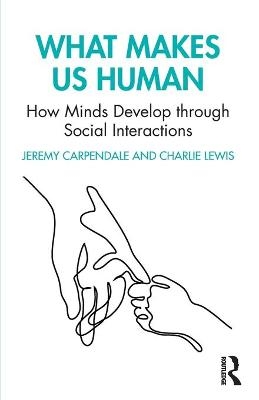
What Makes Us Human: How Minds Develop through Social Interactions
Routledge (Verlag)
978-0-367-53793-7 (ISBN)
"How do you go from a bunch of cells to something that can think?" This question, asked by the 9-year-old son of one of the authors, speaks to a puzzle that lies at the heart of this book. How are we as humans able to explore such questions about our own origins, the workings of our mind, and more? In this fascinating volume, developmental psychologists Jeremy Carpendale and Charlie Lewis delve into how such human capacities for reflection and self-awareness pinpoint a crucial facet of human intelligence that sets us apart from closely related species and artificial intelligence.
Richly illustrated with examples, including questions and anecdotes from their own children, they bring theories and research on children’s development alive. The accessible prose shepherds readers through scientific and philosophical debates, translating complex theories and concepts for psychologists and non-psychologists alike. What Makes Us Human is a compelling introduction to current debates about the processes through which minds are constructed within relationships.
Challenging claims that aspects of thinking are inborn, Jeremy Carpendale and Charlie Lewis provide a relationally grounded way of understanding human development by showing how the uniquely human capacities of language, thinking, and morality develop in children through social processes. They explain the emergence of communication within the rich network of relationships in which babies develop. Language is an extension of this earlier communication, gradually also becoming a tool for thinking that can be applied to understanding others and morality. Learning more about the development of what is right in front of us, such as babies’ actions developing into communicative gestures, leads to both greater appreciation of the children in our lives and a grasp of what makes us human.
This book will be of interest to anyone curious about the nature of language, thinking, and morality, including students, parents, teachers, and professionals working with children.
Jeremy Carpendale is Professor of Developmental Psychology at Simon Fraser University in British Columbia, Canada, and the father of two. Charlie Lewis is Professor of Family and Developmental Psychology at Lancaster University, UK, and the father of two.
Preface, Acknowledgements 1. The Problem: What it is to be Human? 2. The Baby in the Social Cradle 3. Wittgenstein’s Baby: How do Words Work? 4. A Brief History of Babies: How do Babies get the Point? 5. Thinking about the Social World: How do Children Understand Others? 6. Becoming a Moral Being: Early Development, Emotions and Neuroscience 7. Knowing Right from Wrong: Or, How does Morality Develop? 8. From Molecules to Minds: Can Genes Determine Thinking? 9. The Myth of the Desert Island Baby: Is the Mind a Machine? 10. Social Relations and Reason: What are the Implications of Self-Awareness?
| Erscheinungsdatum | 15.01.2021 |
|---|---|
| Zusatzinfo | 10 Halftones, black and white |
| Verlagsort | London |
| Sprache | englisch |
| Maße | 138 x 216 mm |
| Gewicht | 453 g |
| Themenwelt | Geisteswissenschaften ► Philosophie |
| Geisteswissenschaften ► Psychologie ► Allgemeine Psychologie | |
| Geisteswissenschaften ► Psychologie ► Entwicklungspsychologie | |
| Geisteswissenschaften ► Psychologie ► Familien- / Systemische Therapie | |
| ISBN-10 | 0-367-53793-1 / 0367537931 |
| ISBN-13 | 978-0-367-53793-7 / 9780367537937 |
| Zustand | Neuware |
| Haben Sie eine Frage zum Produkt? |
aus dem Bereich


